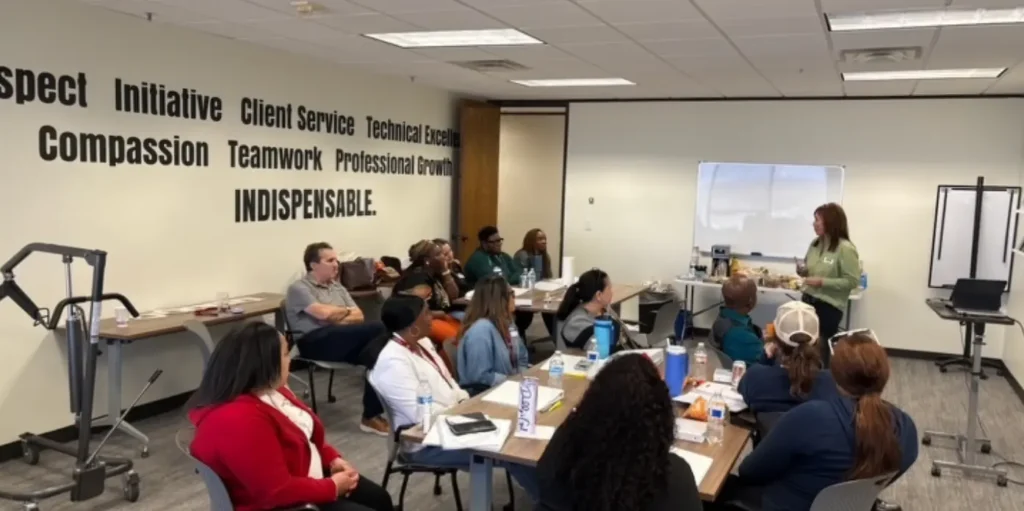The Virtual Dementia Tour: Building Empathy and Understanding
What is it like to live with Parkinson’s, Alzheimer’s, or other forms of Dementia?
We can read medical research or attend a lecture to learn the facts. But to truly understand, it’s important to walk in the shoes of people living with brain change.
To deepen that understanding, Cambridge Caregivers has begun offering the Virtual Dementia Tour (VDT), an educational tool and experience that offers insight into the challenges experienced by our clients. Tours are led by our Director of Nursing, Sandi Levy, RN, a certified trainer with VDT.
“As a Registered Nurse, Certified Trainer for the Virtual Dementia Tour and Director of Nursing at Cambridge Caregivers, I believe it’s essential to equip caregivers with tools that foster empathy and deeper understanding of those living with brain change,” said Sandi Levy, RN.
Members of the Cambridge Caregivers leadership team, as well as our community liaisons have all undergone VDT training. Many caregivers will participate in the coming months.
“VDT allows us to step into the world of those living with dementia, helping caregivers not only recognize their challenges but also respond with compassion, patience and dignity,” Sandi added.
VDT simulates dementia-related symptoms by temporarily altering participants’ physical and sensory abilities. Participants wear eyewear that distorts their vision, headsets that alter their hearing and devices that change their dexterity. They encounter various sights and sounds while attempting to follow simple instructions — all designed to place them in the shoes of a person living with dementia.
Because dementia affects different parts of the brain, VDT simulates symptoms and “tricks” the brain into responding and behaving as it might with dementia. VDT isn’t specific to one type of dementia, such as Alzheimer’s or Lewy body dementia, but rather mimics mid-stage symptoms common across types.
Imagine trying to button a shirt or set a table while feeling overwhelmed by distorted sounds and sights, along with the possibility of diminished dexterity. That’s the kind of experience that VDT participants report.
The VDT was an eye-opener for Ernie Cote, Chief Operating Officer for Cambridge Caregivers.
“It definitely gave me a sense of the confusion and frustration that folks with dementia can experience,” he said. “I heard random voices and noises. I had visual and physical challenges. And then there was the mental strain of attempting simple tasks with all that going on.”
When he was a young adult, Ernie added, he cared for his grandfather, who was diagnosed with dementia. He already knows firsthand how the disease affects people — but the VDT deepened his understanding.
“I wish I had been through this experience years ago — I would have had more empathy for my grandfather,” he said. “It makes me sad to know that he lived like that. His confusion was obvious, and sometimes his frustration turned to anger. I never truly understood until now. I can tell you, if I lived in that state all the time, I’d be very angry, too.”
Ernie’s words remind us that patience and compassion are essential when caring for those with brain change.
At Cambridge Caregivers, we support families who face the challenges of living with dementia every day. This live virtual class is a vital part of our training, helping our team members to better understand what it’s like to live with dementia, and how to best assist and communicate with clients.
If your loved one is living with dementia, know that our team is trained, compassionate and ready to support them with dignity and respect.


